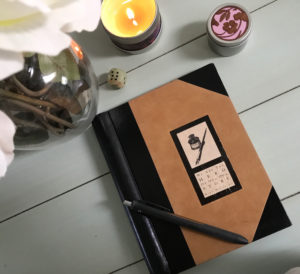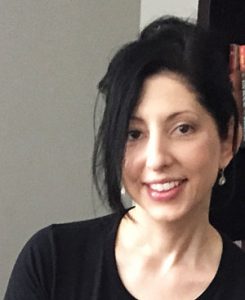There are many things we can draw from our lives to tell stories. But, what if you went through something deeply personal and wanted to tell that story? Maybe you don’t want to write a memoir and expose the painful realities that you experienced with loved ones and others involved. It may feel way too difficult to even divulge the truth about your part in all of it. So, you try and put it away. But, the events keep swirling around your mind, in the form of fiction.
 The truth is, I have been experiencing exactly this. In my younger years, my family faced difficulties that steered us all into dark places. One of the things that helped me through my healing process was a little brown journal with a quote on the cover that said, “We are the hero of our own story,” Mary McCarthy.
The truth is, I have been experiencing exactly this. In my younger years, my family faced difficulties that steered us all into dark places. One of the things that helped me through my healing process was a little brown journal with a quote on the cover that said, “We are the hero of our own story,” Mary McCarthy.
It was that journal and finally living my life in a healthy and happy place, that made me realize I needed to write about what I went through. I scribbled notes and outlines into it and began writing. I thought it would be easy to write this story since, well, I lived it. It wasn’t. The writing was awful.
I let it go and started experimenting, writing short stories and attending workshops, trying to move on, away from the past, but this story, my story, kept pulling me back. So, I faced it, looked straight into the darkness and dove back in, this time with a little more experience and a big dose of reality, knowing, it wasn’t going to be easy.
If you are also using a personal experience to inspire a fictional story, below are five tips to help you write through and move on.
1) Decide
This story has chosen you, but you have decide how to tell it. When I first began to write about what I experienced, I was just writing, trying to take events and circumstances and make them fit into a semi altered version of what happened. It was difficult because there were many incidents and emotions that I experienced very young and then again in my twenties when round two of our family troubles began again.
After my reality check, I knew I needed help beyond what workshops I had attended, and signed up for a writing mentor-ship with Gabriela. The experience was invaluable. With Gabriela’s help and also by Reading with Purpose, I discovered I was approaching this story all wrong. As my mentor, Gabriela helped me realize that what I experienced when I was very young, then again in my twenties, transformed, has the potential to be a Contemporary Young Adult novel. Transformed being the key word. It was pivotal not to feel confined to reality because it was more about the emotions I felt throughout my life that I needed to write about, not the actual events and when they took place.
Give yourself permission to make decisions for the story you need to tell, not the one that happened. Doing this will help you through the next step.
2) Let Go
Just because you lived through something doesn’t mean it will make good fiction. Create a new world, but draw from your experiences and emotions to craft this new world and the characters in it. Letting go of the reality will free your imagination so that you can do this.
Remember, the story you write has to make sense. It has to flow from beginning to end. The reality that I lived brought me to and through many ups and downs for a very long time, before I emerged on the other side. Had I limited myself to actual events, the story I’m writing would be a chaotic mess.
What helped me to let go was to remember the most difficult events I experienced from that time. The ones that impacted me the most. I thought of how I could change them, but how they could still be as emotionally powerful. Those key events became the bones of my story, and I wrote around them, eventually connecting it all from beginning to end.
3) Explore— Let it be Therapeutic
Writing this story may be a way to continue healing if you haven’t already, a form of therapy. Explore your feelings through the letting go. Doing this will allow you to dive deeper.
Keep a journal. I recommend finding one that speaks to you with a meaningful quote or art on the cover. Write whatever you feel about the past, present, and future. Reflect on your life as it was and is now. Memories and feelings you stuffed away may resurface. If you have journals you wrote in from that time, take them out and go through the pages. You will be reminded about and amazed by your transformation from then to now.
With all of your feelings and memories fresh, explore the possibilities of what could have happened. What did you wish someone would have said or not said? Think about how your decisions or the decisions of others influenced the situation, your emotions, and the outcome. How could the situation have been worse? Maybe that is where your story is.
4) Finish It— So you can move on
Whether it is just a story for you to read or if you want to get it out into the world, don’t give up. Finishing this novel is a way of building writing muscles. You will make discoveries as you go through the process of writing and rewriting.
In my own experience, I learned 1) How and when I work best, 2) What sensory triggers get me writing the fastest, 3) How I process my thoughts through notes and mind maps, and 4) The never ending lesson of Honor Your Reality, which saved me from curling up into a tiny ball and sobbing on many occasions.
But, the best part of going through the process and finishing…in pushing through when it feels too difficult and learning from the letting go, you might find your mind wandering at times, because of the freedom you have given yourself. Ideas may begin coming to you for the next novel. You will realize you have so many stories inside of you.
5) Let Go Again
Realize though this story may be important to you, it may not be one that gets published.
No matter what happens, writing the story you need to tell, will be a great accomplishment. You might find, that as you get closer to the finish line, getting it out into the world will not be what drives you in that last sprint. Just getting it out of you, a finished, polished draft, a goal met, will make you want to dance!
I am not dancing yet, but I feel a rhythm in my step. I’m nearing the end of this journey, and I intend to give my all in the next phase of pitching and sending queries, but, I also feel ready to let go when the time comes. I did the work, and now that I did, I realize I can do it again. Because of sticking through and doing the work, I have experienced an incredible reward of feeling stronger not just for living through the reality, but for seeing through the story.
 Linda Bernadette Burgess is a multi-passionate artist and entrepreneur. Her business partner, who is also her husband shares these multi-passions and they have several fun projects on the horizon. She is currently working on a Contemporary YA novel and a variety of short stories.
Linda Bernadette Burgess is a multi-passionate artist and entrepreneur. Her business partner, who is also her husband shares these multi-passions and they have several fun projects on the horizon. She is currently working on a Contemporary YA novel and a variety of short stories.
All other free time is spent entertaining her dogs.
Visit her at lindabernadetteburgess.com







